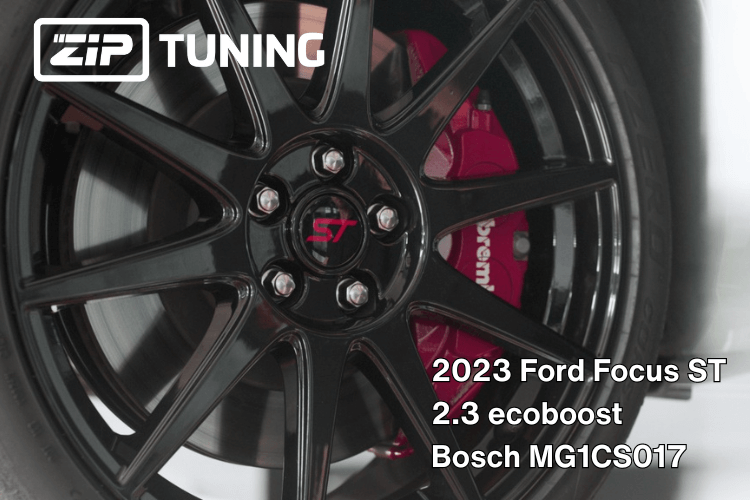ECU Tuning for the 2023 Ford Focus ST: Unleashing the Potential of the 2.3L EcoBoost
POSTED IN nieuws
The 2023 Ford Focus ST, equipped with the potent 2.3L EcoBoost engine and Bosch MG1CS017 ECU, presents an exciting platform for performance tuning. This article delves into the intricacies of ECU tuning for this vehicle, exploring the various stages of modification and their impact on performance.
Stock Specifications
Before we dive into the tuning process, let's review the stock specifications of the 2023 Ford Focus ST:
- Engine: 2.3L EcoBoost
- Stock power output: 280 hp (209 kW)
- Stock torque: 420 Nm (310 lb-ft)
- ECU: Bosch MG1CS017
Tuning Stages and Modifications
Our tuning package for the 2023 Ford Focus ST offers two distinct stages of performance enhancement:
Stage 1
Stage 1 tuning focuses on optimizing the ECU parameters without any hardware modifications. This stage typically involves:
- Adjusting fuel maps for improved efficiency and power
- Modifying ignition timing for optimal combustion
- Fine-tuning boost pressure control

Stage 2
Stage 2 builds upon Stage 1 and incorporates hardware modifications:
- Decat (catalytic converter removal)
- OPF (Otto Particulate Filter) removal
- Enhanced intake and exhaust systems
Both stages also offer the option to implement a pop & bang feature, which we'll discuss in detail later.
Technical Analysis of the Tuning Process
Tuning the Bosch MG1CS017 ECU requires a deep understanding of its architecture and the Ford EcoBoost engine management strategy. Key parameters modified during the tuning process include:
- Boost pressure control maps
- Fuel injection timing and duration
- Ignition timing maps
- Torque management parameters
- Rev limiter and speed limiter adjustments
One of the primary challenges in tuning this ECU is maintaining the integrity of Ford's sophisticated torque targeting system. As noted in the Motorsport Developments article, improper calibration can lead to drivability issues such as aggressive throttle response, unpredictable power delivery, and difficulties in maintaining steady cruising speeds.
Boost Pressure Analysis
Stock boost pressure for the 2023 Ford Focus ST typically peaks around 1.5 bar (21.8 psi). Our tuning stages modify this as follows:
- Stage 1: Up to 1.7 bar (24.7 psi)
- Stage 2: Up to 1.9 bar (27.6 psi)
It's crucial to note that these figures represent peak values, and the actual boost pressure varies based on factors such as engine load, RPM, and ambient conditions. Our tuning strategy focuses on optimizing the boost control to provide a balance between performance and engine longevity.
Performance Gains
While exact gains can vary depending on factors such as fuel quality and ambient conditions, typical performance improvements are as follows:
Stage 1:
- Power: 310 hp (231 kW) / +30 hp
- Torque: 460 Nm (339 lb-ft) / +40 Nm
- 0-100 km/h (0-62 mph): Improved by approximately 0.3 seconds
Stage 2:
- Power: 340 hp (254 kW) / +60 hp
- Torque: 500 Nm (369 lb-ft) / +80 Nm
- 0-100 km/h (0-62 mph): Improved by approximately 0.6 seconds
OPF Removal and Decat Considerations
While removing the OPF and catalytic converter can yield significant performance gains, it's important to consider the implications:
Benefits:
- Reduced exhaust back pressure
- Improved exhaust flow and turbo spool
- Enhanced engine sound

Risks:
- Increased emissions
- Potential legal issues in regions with strict emissions regulations
- Possible warranty implications
Pop & Bang Feature
The pop & bang feature, while popular among enthusiasts, requires careful implementation. Our approach focuses on creating a subtle effect rather than the overly aggressive "gunshot style" that can cause social and mechanical issues[1].
To implement this feature, we modify:
- Fuel cut-off strategies during deceleration
- Ignition timing on throttle closure
- Exhaust valve control (if electronically controlled valves are present)
It's important to note that while this feature can enhance the auditory experience, it may slightly increase fuel consumption and emissions.
Reliability and Longevity Considerations
To maintain engine reliability with increased power output, we implement several safeguards:
- Conservative timing advance to prevent detonation
- Fuel enrichment under high load to manage exhaust gas temperatures
- Boost limiting based on intake air temperature
- Torque management to protect the drivetrain
Compliance with Regulations
It's crucial to note that some modifications, particularly those involving emissions equipment removal, may not be legal for road use in certain jurisdictions. Always consult local regulations before implementing performance modifications.
Conclusion
The 2023 Ford Focus ST with the 2.3L EcoBoost engine offers significant tuning potential. Through careful optimization of the Bosch MG1CS017 ECU, substantial performance gains can be achieved while maintaining drivability and reliability. However, as with any performance tuning, it's essential to consider the balance between power, drivability, and longevity to ensure the best possible outcome for each individual vehicle.


